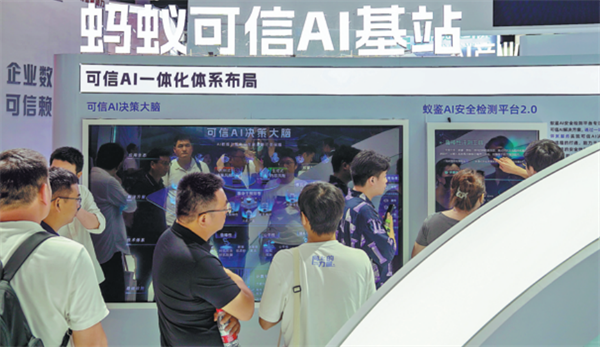



Visitors check out the display screens of the AI-generated content solution from Ant Group during the 2023 World Artificial Intelligence Conference in Shanghai on July 7. CHEN MENGZE/FOR CHINA DAILY
Beijing has launched a package of supportive policies to drive the innovative development of AIGC.The municipal government has also encouraged local companies and government departments to "purchase and use safe LLMs and related services", Dai said.
For their part, Shanghai, Shenzhen, Hangzhou, Nanjing, Suzhou and Chengdu have all unveiled supportive policies to drive LLM development, in terms of computing power, data and ecosystem.
Shanghai, for instance, will provide support for the companies' computer power investment to drive the R&D of LLMs. Shenzhen plans to launch a guideline for open-source apps and sharing of public data by the end of this year.
There is a good reason, or concern, behind such policymaking. "The US continues to move forward. If China can't make its own universal LLM in the second half of this year, we might not even be able to see the 'taillights of cars' in the future," said Yu Linwei, deputy head of Shanghai's Xuhui district, at the World Artificial Intelligence Conference held in Shanghai in July.
The China Electronics Standardization Institute, which is part of the Ministry of Industry and Information Technology, the country's top regulator of industries, said a national standard for LLMs would be implemented soon.
It has enlisted internet search leader Baidu Inc, telecom giant Huawei Technologies Co, cybersecurity firm 360 Security Technology and e-commerce company Alibaba Group, to lead in the development of the LLM standard.
"More efforts are needed from the government to increase investment so that China can truly stand at the forefront," Dai said.
Chinese tech heavyweights' chatbots launched to rival ChatGPT have higher requirements for computing capacity for LLM training, he said.
In a report, HSBC analysts said a model at the level of OpenAI's GPT-3 requires at least 1,000 AI chips of Nvidia to complete one 23-day round of training; so, demand for AI graphics processing units, which can process many pieces of data simultaneously, will likely grow by more than 40 percent in China this year.
But high-performance computer chips, or semiconductors, are now at the center of tension between Washington and Beijing. The US government in October announced export bans aimed at restricting China's access to high-end chips.
"US companies like Nvidia currently have the lead in developing AI chips and few Chinese companies can compete against ChatGPT given the export restrictions," said Pascale Fung, director of the Center for Artificial Intelligence Research at the Hong Kong University of Science and Technology, in an interview.
Given the complex scenario, what will the future LLM landscape look like? At the annual conference of the Beijing Academy of Artificial Intelligence in June, OpenAI CEO Sam Altman emphasized the importance of collaboration between US and Chinese researchers.
Such collaboration, Altman said, can help mitigate the risks of AI systems, against a backdrop of escalating competition between Washington and Beijing in technology. "China has some of the best AI talent in the world and, fundamentally, given the difficulties in solving alignment for advanced AI systems, this requires the best minds, from around the world."